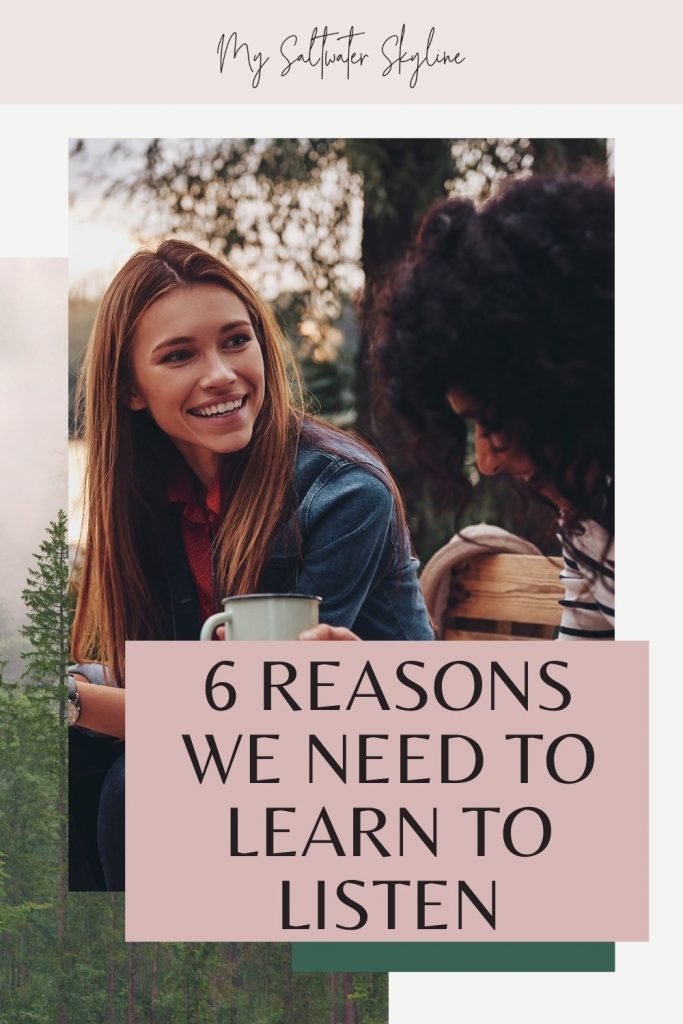6 Reasons We Need to Learn to Listen
6 Reasons We Need to Learn to Listen
Have you ever caught yourself out in what I call ‘auto-pilot listening’? It’s when you’ve acknowledged the person that’s talking to you with a ‘Mmm?’ or a ‘Yes, I’m listening’ only to realize that listening isn’t quite the same when you’re chopping the onions or wiping down the kitchen counter. Really, you weren’t listening at all. At least not as much as you want to believe you were.
This can cause all sorts of problems like hurt feelings, lack of trust, and plain old irritation. Let’s face it, the person on the other end of this one-way conversation is feeling rejected. Here’s the thing, we ALL do this to each other! So, I think it’s time we took a serious look at the communication skill that is Listening!
Once we see how much it influences the strength of our relationships we are sure to put in a lot more effort to use this skill in the future. So, with that said (hope you were listening!), let’s take a look at what we have to gain from laying down the washcloth, looking someone in the eyes and listening to them properly.
1) Strengthening our Compassion
When you really listen to someone you are taking in all the information they are sharing. You are opening yourself up to understand all the elements of the situation, how they are feeling about it, and where they are coming from. When you do that, you begin to connect with them on an emotional level.
Listening to someone allows you to ‘walk a mile in their shoes’ so to speak. You feel compassion for them and their situation, even if you don’t fully understand. You are fully aware of how they are feeling about the situation because you are focused on them. When you don’t focus your full attention on someone you can miss these important details about how they are feeling.
Approach the conversation with the intention to be open and to try to understand the other’s point of view. This is a compassionate approach. Remind yourself that we are all living in our own bubble, aware only of our own feelings and experiences, unless we make the effort to be open to seeing the world from someone else’s perspective.
2) Builds on our Communication Skills
Once you start to actively work on your listening skills you will see how it effects the way you communicate in general. When you understand that focusing all your attention on the person you are communicating with has so many benefits, you will want to change the way you do things.
Imagine getting into a heated argument. Both parties are shouting, forcing their argument out into the world where it merely bounces off the other party. Angry fbombs fill the air around both of you. Now, picture the two parties taking a breath and sitting down (count to 10 if you must). You immediately meet each other on a level playing field. You have shown respect for each other. And, the lines of communication are open.
When we are able to approach our communication from a respectful, calm perspective we allow everyone’s voice to be heard. You now have the chance to express yourself without feeling judged or just plain dismissed. When the lines of communication are open in this way you can start the conversation with how you are feeling. What has upset you or angered you. You then wait to hear their side. From there you try to find a middle ground.
3) Establishes Trust
You have something important you want to share. Imagine 2 different ways this conversation can go down. In the first one, you can’t seem to make eye contact with the other person. They are on their phone, or busy with some task or other. Their attention is not fully on you. Now and then you get short, abrupt responses. How does this conversation make you feel?
Now, in the second conversation you sit down opposite each other. Your partner holds your gaze during the conversation and replies with considered and probing questions. You know you have been fully understood and respected and feel more inclined to trust your partner will be there for you going forward. This is a little bit like filling someone else’s cup. This seemingly small gesture helps to make you feel safe, relaxed and respected.
There will be times when you just can’t seem to find a middle ground. All your best efforts can’t seem to stop the inevitable argument. But, learning to communicate better, to establish trust, will see you overcoming more and more obstacles through mutual respect. The more you work at it, the better it will get.

4) Helps Focus on What’s Important
This can apply to both the actual person, who should absolutely be the most important thing, and the subject. Heated arguments result in a lot of, often nasty, digressions. When you listen and respect the other persons viewpoint there is less room for ‘missing the point’. And less room for unnecessary escalations!
Sometimes an argument becomes like an avalanche of negative comments that you can’t seem to escape. You might even find yourself thinking ‘this is going to end badly’ or ‘why did you say that’. The truth is we don’t want to say hurtful things to each other, but when we feel like we aren’t being heard we lash out.
Taking the time to sit down and give each other the stage for a moment allows the conversation to be laser focused on what matters. No nasty side notes, just the big issue that needs to be addressed. When you communicate effectively like this it also means you are able to resolve issues more quickly and move on more quickly!
5) Lessens Miscommunication
Actively listening to someone means there is little room for distraction that can lead to ‘assumptions’ about what someone has said. In other words, not only are you less likely to get an irritated look and a ‘are you listening to me?’ but you will also know exactly where the person is going with the conversation. Nothing is left to the imagination.
Feeling like you are not heard is a terrible feeling. You feel disrespected, and deeply hurt. But, when you feel fully heard you feel acknowledged and respected. You are more willing to share. This miscommunication often shows up in situations like getting the details mixed up for a party invite for example. Smaller life details like this are often mentioned in passing. We send them out into the universe expecting others to reach out and grab them, instead of consciously making sure our message is received. The problem with this is that, quite often, it is either not received at all or only partly.
In walks miscommunication, and frustration is not far behind. If we take the time to make sure even these small messages are fully and clearly received we can avoid future irritation. Take the time to communicate properly, it will save you a lot of headaches!
6) Saves Future Heartache
When you are engaged in a conversation you are contributing. First you listen, then you engage. Ask questions to gain a deeper understanding of the situation. And then listen again. Don’t wait to speak, just listen. Take it in. Consider what the other person is saying. Actually give them the time to try to see things through their eyes. This holding space for someone is a powerful way to build on your relationship with them.
Once you have established trust through open communication you allow people to feel supported. Giving someone the space to share at their lowest point through listening is like building an emotional shield for them. You are showing them they are safe with you. What more could you ask than to feel safe and supported by the people in your life?
Listen with your Whole Body
Listening isn’t just about what you hear. It is about what you observe. Going back to my ‘Mmm hmm’ answers, without looking someone in the eyes you will never be fully focused on them and the conversation. Take it one step further by sitting down with them. If it is an emotional subject, take their hands in yours. All these physical responses are showing them you care and you are listening.
Set yourself a task today to watch people’s body language. We all know about body language, but when last did you try to ‘read’ someone by their body language? When a teenager rolls their eyes at you they are sending a clear message, but do we really listen to it? My point is that if we are more tuned in to what people are trying to say, with more than just their words, in other words ‘listening with our whole bodies’, then we are more aware and more able to give them what they need.
Remember There are 2 Sides
A point to remember is that every conversation has two sides. Two sets of emotions, and two sets of perspectives. This means the listening needs to be coming from both sides. So, when you are feeling ‘unheard’ and ratty remember that for you to get your point across you need to practice active listening as well. It is not just the other person who needs to be listening. There will always be something that they have to say, to add or even to argue about. You need to be open to listening to them too. Otherwise it’s one-sided.
Because, as I mentioned earlier, we are all only aware of our own experience! Even if we’ve been living with someone for 20yrs! We need to actively choose to listen, to be open, and to value the experience of the other person. Appreciate that you may not understand how they are experiencing life, in fact you probably cannot ever fully understand.
Being a parent I know it is easy to assume that you’ve ‘been there’ and that there’s nothing you haven’t been through or can relate to. This just isn’t true. We all live our own experiences in our own way and are impacted differently by them. So, try to remember this the next time you sit down with someone.
Part of the Lesson is Calm
The subject of the blog is listening, but I feel I should add a side note on being calm. There is no way to truly listen while stress or anger are part of the conversation. Finding a sense of calm is essential for open and honest communication. Part of the power behind listening is the calm approach. The sitting down, and the looking someone in the eye. These have a calming effect and are a great starting point for any conversation.
The next time you find yourself in an arguement, think about your posture and whether or not you are giving the other person the ‘space’ that they need to be fully heard. You may feel that you are the one who needs to be heard, and that’s okay too. Invite them to sit down and listen to you! But always find a way to calm the situation first, and then carry on your conversation.
Take-aways on Listening
So, my take-away on listening is this. Listening is more than just hearing and responding. It is a super important part of a healthy relationship. It shows respects, builds trust and forms the basis for a healthy relationship going forward. This is no small thing! We need to take this undervalued skill more seriously. It should be taught in schools! Why? Because it teaches us how to be kinder and better people. Learning to see through someone else’s eyes, to see their perspective makes us compassionate and shows that we care.
I hope you’ve enjoyed this blog and it has inspired you to look at how you’ve been communicating with your loved ones. Thanks for reading!
Steph x
My blogs are all written with love and available to be read for free. I am so grateful for any support from my readers. If you enjoy my blogs a great way to keep them coming is to:

Check out this great article on Active Listening on Asana
Let me share some of my favourite Personal Growth resources with you!
Here’s a list of Recommended Courses in Personal Growth
For fascinating shows on Spirituality and the Mind watch Gaia
Design your own images on Canva










